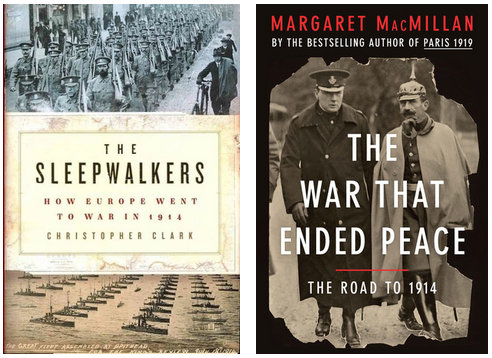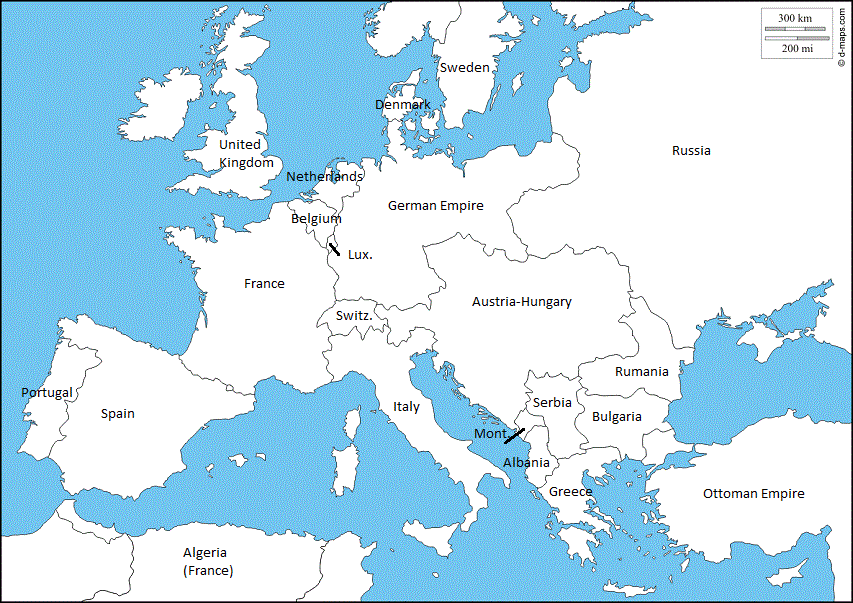It’s an easy question to ask, but a very hard one to answer. Traditionally, most people would answer “Germany”, with greater or lesser intensity as the years have passed (for example, here’s Boris Johnson making this particular case). More realistically, you might say Germany, Serbia, Austria, and Russia. Or just Serbia. Or just Russia. Or Britain (according to Niall Ferguson). Or France. Or the inflexible railway timetables for mobilization (Barbara Tuchman and others). Lots of candidates, none of whom can be clearly identified as the prime villain, because you can’t look at the situation in Europe in 1914 as anything other than complexity compounded.
Two recent works (both highly recommended) discuss the origins of the war in great detail and I’ve drawn on them for much of these posts:

The Sleepwalkers: How Europe Went to War in 1914 by Christopher Clark and The War That Ended Peace: The Road to 1914 by Margaret MacMillan
There have been so many books written about the origins of the First World War because the origins are many, diverse, interconnected, and hard to weigh against one another in any rational fashion. The assassinations in Sarajevo turned out to be the triggering event, but the war could easily have broken out at any of several other potential flash points in the preceding decade — and even then, war could still have been prevented from breaking out in the summer of 1914. In some ways, it’s surprising that the alternative history folks haven’t been more active in exploring that era: the possibilities are quite fascinating (on second thought, having put this post together, the degree of confusion may account for the novelists wisely avoiding the topic after all).
Although many authors refer to the various monarchs as active participants in the diplomatic and political spheres, this is not always an accurate way to consider their roles. The Tsar enjoyed the equivalent of a presidential veto and could start or stop government activity with a word … but most matters, even high-level military and diplomatic issues, would only come to his attention quite late in the process. This meant the Tsar might want to change his government’s course but because the situation was already well advanced, the costs to do so might well be insurmountable. Tsar Nicholas II was perhaps the worst-equipped of all the leaders of Europe for the task facing him, emotionally and intellectually (and he was aware of his weaknesses). Even Kaiser Wilhelm, who was well-known for his quixotic interference in military and diplomatic matters, was not the sole autocrat of German policy. The chancellor and the foreign secretary could (and did) overrule the Kaiser’s whims on many occasions. On the other hand, King George V was the least directly involved of all the rulers in the actions of his empire, but his public stance may have been somewhat at variance with his private communications with crown ministers (for example, this recent article in the Telegraph claims that the King pushed Sir Edward Grey, the Foreign Secretary, to “find a reason” to declare war on Germany).
A common misconception of the state of Europe in early 1914 was that the preceding century had been a golden age, peaceful and calm (think of all the discussions of the idyllic Edwardian era when contrasted with the chaos and disorder of 1914-1945 and beyond). Europe was only peaceful between 1815 and 1914 by contrast with previous centuries … there were many wars and the map of Europe was redrawn several times in that century. As Christopher Clark wrote:
Though the debate on this subject is now nearly a century old, there is no reason to believe that it has run its course.
But if the debate is old, the subject is still fresh — in fact it is fresher and more relevant now than it was twenty or thirty years ago. The changes in our own world have altered our perspective on the events of 1914. In the 1960s-80s, a kind of period charm accumulated in popular awareness around the events of 1914. It was easy to imagine the disaster of Europe’s ‘last summer’ as an Edwardian costume drama. The effete rituals and gaudy uniforms, the ‘ornamentalism’ of a world still largely organized around hereditary monarchy had a distancing effect on present-day recollection. They seemed to signal that the protagonists were people from another, vanished world. The presumption stealthily asserted itself that if the actors’ hats had gaudy green ostrich feathers on them, then their thoughts and motivations probably did too.
Margaret MacMillan shows how easily the calculations could go so wrong, so easily:
As we try to make sense of the events of the summer of 1914, we must put ourselves in the shoes of those who lived a century ago before we rush to lay blame. We cannot now ask the decision-makers what they were thinking about as they took those steps along that path to destruction, but we can get a pretty good idea from the records of that time and the memoirs written later. One thing that becomes clear is that those who made the choices had very much in mind previous crises and earlier moments when decisions were made or avoided.
Russia’s leaders, for example, had never forgotten or forgiven Austria-Hungary’s annexations of Bosnia and Herzegovina in 1908. Moreover, Russia had failed to back its protégé Serbia when it confronted Austria-Hungary then and again in the Balkan wars in 1912-13. Now Austria-Hungary was threatening to destroy Serbia. What would it mean for Russia and its prestige if it stood by yet again and did nothing? Germany had not fully backed its ally Austria-Hungary in those earlier confrontations; if it did nothing this time, would it lose its only sure ally? The fact that earlier and quite serious crises among the powers, over colonies or in the Balkans, had been settled peacefully added another factor to the calculations of 1914. The threat of war had been used but in the end pressures had been brought to bear by third parties, concessions had been made, and conferences had been summoned, with success, to sort out dangerous issues. Brinksmanship had paid off.
Part one of a series of posts (I’m still digging deeper, so I’m not sure how many parts there will be…)




